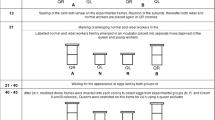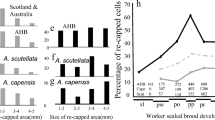Summary.
Cape honeybee laying workers (Apis mellifera capensis) produce female diploid offspring and are facultative social parasites. In queenright host colonies, such workers have to evade worker policing (removal of worker-laid eggs by other workers) to successfully reproduce. One mechanism seems to be low removal rates of eggs laid by parasitic workers. However, because queenright colonies of other subspecies (e.g. the neighbouring A. m. scutellata) are susceptible hosts, social parasitic workers probably also use behavioural tactics to evade policing. Indeed, field observations of infested A. m. scutellata host colonies indicate that brood from parasitic workers initially appears away from the queen. The egg removal rates for queen and worker-laid eggs were recorded in the top and bottom boxes of three queenright A. m. capensis and A. m. scutellata colonies, where the queens were caged in the bottom boxes. The egg removal data show that both subspecies are able to police worker-laid eggs, because more queen-laid eggs remained than worker-laid eggs in the bottom boxes. However, fewer A. m. capensis worker-laid eggs remained in the bottom boxes than in the top boxes. Moreover, whereas A. m. capensis also polices in the top boxes, no significant differences between the removal rates of worker and queen laid eggs were found in the top boxes of the A. m. scutellata colonies. This indicates that worker policing is not always fully effective in A. m. scutellata and may explain why this subspecies is so susceptible to infestations. Our results also show that worker policing is less likely away from the queen. Therefore, queen evasion by laying social parasitic A. m. capensis workers appears to constitute a behavioural tactic to achieve successful reproduction in queenright host colonies.
Similar content being viewed by others
Author information
Authors and Affiliations
Additional information
Received 17 June 2002; revised 21 November 2002; accepted 27 November 2002.
Rights and permissions
About this article
Cite this article
Neumann, P., Pirk, C., Hepburn, H. et al. Spatial differences in worker policing facilitate social parasitism of Cape honeybee workers (Apis mellifera capensis Esch.) in queenright host colonies. Insectes soc. 50, 109–112 (2003). https://doi.org/10.1007/s00040-003-0610-7
Issue Date:
DOI: https://doi.org/10.1007/s00040-003-0610-7




